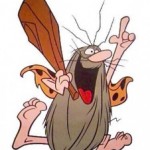Human Ancestors Were Good Dads
Posted on 19. Mar, 2010 by Brian Reid.
 OK: let’s forget about the fish.
OK: let’s forget about the fish.
Turning to much more interesting (and, perhaps, applicable) science, Evolution of Dad spotted this excellent piece on, um, the evolution of dads that stemmed from a publication in American Anthropolologist. As Discovery News put it:
Gettler’s hypothesis aims to explain a mystery anthropologists have long explored. When the Homo genus branched off from other ape descendants, it grew larger by increasing caloric intake and reducing energy expenditures. The largest energy expenditures found in primate species is child-bearing and rearing.
Yet even as our pre-human ancestors grew larger, the amount of time between pregnancies — known as the interbirth interval — actually grew shorter than their smaller ancient counterparts. Females began having more, rather than fewer, children.
Gettler said the shorter interbirth interval and the long period of child rearing characteristic in modern humans could have only happened with ancient dads lending a hand.
The story goes on to talk about the way that dads helped contribute to the brain growth seen in those early humans (it wasn’t just mom dropping knowledge on the kids). Needless to say, I’m tickled at the idea that humans couldn’t have become human without fathers stepping up and playing a major role in child development. It’s a reminder that the whole mom-stays-home, dad-goes-to-the-office-for-80-hours-a-week is a new invention and that dads have been involved for a long, long time.
Maybe I’ll have to rename the blog “CavemanDad.”
Permalink
Colbert on March Nad-Less
Posted on 18. Mar, 2010 by Brian Reid.
I take seriously my obligation to serve as a resource for those dads seeking information and perspective on vasectomies, so I must, in in the interest of comprehensiveness, forward along Stephen Colbert’s thoughts on the ol’ snip-snip:
| The Colbert Report | Mon - Thurs 11:30pm / 10:30c | |||
| Sport Report - Vasectomies, Chess Boxing & Golf | ||||
|
||||
Permalink
Eric Carle, ‘Mr. Mom’ and the Truth About Pipefish
Posted on 17. Mar, 2010 by Brian Reid.
A few years ago, Eric Carle published a charming book called “Mister Seahorse” about all of the sea creatures in which fathers played a huge role in the whole kid thing. It is rather wonderful propaganda, though it would be an even more wonderful world if Eric Carle didn’t have to work so hard to find examples (what the heck is a “stickleback,” anyway?).
At any rate, the pipefish is one of the starring characters of “Mister Seahorse,” as it is one of the few animals in which it is the male of the species that becomes pregnant and gives birth. This seems to be very cool to my dad-centric view of the world. But new research today out of the journal Nature suggests that maybe the pipefish isn’t the best role model for human dads. As the press release delicately puts it:
The Texas A&M researchers studied consecutive broods in male Gulf pipefish to understand why some offspring survive while others do not. Their results reveal that the males who were especially fond of the females they had mated with were more likely to show a nurturing attitude toward their offspring. In almost every case, those that were not overly fond of the mother were less nurturing toward their young.
“The bottom line seems to be, if the male likes the mom, the kids are treated better,” Paczolt explains.
Sorry, Eric. We might have to cross the pipefish off of the cool-dad list.
For a more thorough explanation, here is some video about these guys …
The Texas A&M researchers studied consecutive broods in male Gulf pipefish to understand why some offspring survive while others do not. Their results reveal that the males who were especially fond of the females they had mated with were more likely to show a nurturing attitude toward their offspring. In almost every case, those that were not overly fond of the mother were less nurturing toward their young.
“The bottom line seems to be, if the male likes the mom, the kids are treated better,” Paczolt explains.

